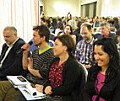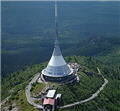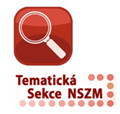 |
Newsletter
Healthy Cities of the Czech Republic
|
 |
|
|
II/2015 (EN)
Dear Colleagues,
please let us inform you about activities and happenings in Healthy Cities,
Towns and Regions in March and also provide information about selected activities
and events, which will take place in the oncoming period.
(NOTE: Some of the website links are available only in Czech, in that case
you can use the Google Translate toolbar, which can be found on the left side
of the HCCZ web page.)
I believe that this new HCCZ Newsletter will be for you an interesting and useful
source of information and inspiration from Czech Healthy Cities and Regions.

Petr Svec
HCCZ Director and National Healthy City Project Coordinator
|
 |
National Healthy Cities Networks from throughout Europe met in Milan
Representatives of National Healthy Cities Networks met again after a year, this time in Milan, to discuss current issues related to further development of Healthy Cities, Towns and Regions within Europe. The meeting, which took place from 24 to 26 March 2015, was prepared by the Italian Healthy Cities Network in cooperation with the City of Milan and representatives of the European WHO (World Health Organisation) Office. The event was attended by a total of 14 national coordinators and a number of other experts on the issue of health support.
Representatives of individual countries presented their current approaches and activities, discussed key competences of national coordinators and the options national networks have to support their member cities. The example of Estonia was mentioned, where the topic of health was especially emphasised within the terms of preparation for drawing of European funds – submission of applications for projects was conditional to the existence of a health profile for the specific municipality. The presentation by Israel inspired listeners with the methodology used to evaluate the community resilience – e.g. measure how well a specific community is capable of confronting potential threats, risk or crisis situations thanks to its social cohesion and interconnection. Coordinators discussed possible international cooperation and sharing of best practice.
Interesting publications and other educational tools, which could be used in practice by cities were presented by representatives of the WHO sub-network, which is concerned with the issue of Health Equity. This group prepared several PowerPoint presentations, which could be used to grasp the topic in practice. Other interesting publications and materials, which can be used for supporting health not only on the level of municipalities or regions, can be found on
this WHO website.
Coordinators of European networks also discussed the method of addressing and actively involving newly elected politicians in application of health and sustainable development in practice. Two hundred case studies from all over Europe, which the WHO Regional Office for Europe received from its members and which represent practical and tested examples of intervention and projects in the field of health, were also mentioned.
Representatives of National Healthy Cities Networks from the Czech Republic, Denmark, Israel, Germany, Austria, Great Britain, France, Greece, Spain, Latvia, Turkey, Sweden and the Baltic Association of Healthy Cities Networks and the partner WHO Centre in Belfast, met at this event. The next WHO meeting, this time a traditional international conference for all Healthy Cities and other parties interested in the subject, will take place at the end of June 2015 in Kuopio in Finland.
|
 |
World Health Day focused on food safety this year
The World Health Organisation (WHO) announced 7 April as World Health Day. The campaign, supported by Healthy Cities, focuses on one specific topic each year. This year the World Health Day topic is food safety. According to WHO information, food containing harmful bacteria, viruses, parasites or chemical substances are responsible for over 200 types of illness. The campaign endeavours to point out the fact that, particularly in our globalised world, it is necessary to ensure food safety during all steps in the long chain of proceeding of food from its point of origin to consumption. The Public Health Institute, which prepared a short instructional video and competition for students, is also a promoter of the event.
More information on the topic of this year’s World Health Day, including links to other sources, can be found on the website of the WHO Czech regional Office in Prague.
|
 |
The Healthy Cities Spring School in Tabor welcomed a record number of participants
The Healthy Cities Spring School took place in Healthy City Tabor between 18 and 20 March 2015. The event was attended by over 120 representatives of Cities, Towns and Regions of the Czech Republic.
Interesting inspirations from Healthy Cities or campaigns and services by associations and partner organisations were presented during the initial seminar. Petr Svec, HCCZ Director, presented news from the National Healthy Cities Network, for example the new thematic portal Youth Friendly City (www.MestoMladym.cz), a publication by Milan Pucek on sustainable financial management, or use of emotion mapping at Healthy Cities Forums. Ondřej Kolinsky from the Government Office of the Czech Republic informed about European Sustainable Development Week (30/05-05/06/2015), the aim of which is to explain the topic and issue of sustainable development to the public or acquaint people with the options for becoming involved in public affairs. Cities and municipalities were invited to participate in this European-wide campaign.
Secretary Lubomir Sramek welcomed participants to this event on behalf of the host city. He acknowledged Healthy Cities as a good platform for exchanging and sharing experience and best practice. He also presented the city’s most interesting activities, for example measures for ecologisation of the municipal authority, involvement of and communication with citizens or experience in use of CNG.
Jan Sedlacek, mayor of the village of Krizanky presented a new project which should help mayors of small villages with their management, for example by running a legal advisory or publishing a brochure titled The Mayor’s Handbook. Jakub Vebr from the Centre of Ecological Education and Ethics acquainted listeners with his project focusing on young people, the aim of which is to explain the terms sustainability and Millennium Development Goals and help understand the global context. At the end of the afternoon block Leos Gal, chairman of the Czech Technological Biofuels Platform presented the RESTEP tool – an interactive map of renewable resources for regionally sustainable energy planning.
The afternoon block was opened by Josef Novak from the CI2 Company with a presentation devoted to indicators of sustainable development in cities in the context of Healthy City. He was followed by Jiri Panek from the Natural Science Faculty of Palacky’s University presenting creation and use of emotion maps and the possibility of interconnecting them with Healthy Cities Forums. After the presentations participants were able to choose from methodological blocks for beginners or advanced parties on the topics of quality procedures for strategic and community planning and management in municipalities.
Practical training took place on the following Spring School days, including practicing work with the DataPlan information system and individual consultations.
See the event video HERE, find presentations, photos and much more info HERE.
This event is part of the HCCZ project “STRATEG-2”, which is financed from ESF funds by means of the Human Resources and Employment Operation Programme and the Czech State Budget.
|
 |
Meeting and informing new politicians - “Healthy City Project – the path to success”
Inspiration and good practice in relation to top-quality management of municipalities, public engagement, energy efficiency, cooperation with young people, transport and on many other topics from city practice could be found on a Czech Healthy Cities event, held in Prague on April 28th.The event was an open discussion block for all parties interested in the specific subjects. Newly elected politicians could find answers from their colleagues – experienced in Healthy City Project and overal city management.
The topics were e.g. public involvement, either through campaigns or planning actions at round tables, as well as discussions on investment and organizing open-air public forums. Participants gained experience on procedures and specific benefits of energy management in the cities of Litomerice and Letovice. Deputy Mayor of Steti presented suggestions for possible mobilization of young people in the city, highlighted the theme of social inclusion and the importance of ensuring equal access for all city residents to housing, education, employment, or leisure time. A long-term and systemic cooperation of Cities and local businesses was underlined – in Koprivnice this cooperation brought a number of mutual inspiration and ideas, but also recognition from the region. Practical examples from small villages mentioned the mayor of Krizanky, added the importance of having a local school in the village and the necessary cooperation between locals and “weekenders”.
The event was very welcomed by the HC beginners and the association will follow with peer activiteis and sharing good practice.
|
 |
A meeting of Czech Healthy Regions took place in Liberec
The annual Meeting of Czech Healthy Regions took place on Thursday 12 February 2015 in the Liberec Region. The purpose of this meeting was to share proved procedures and inspiration in relation to development of WHO Healthy City / Region Project and discuss mutual cooperation with municipalities, sub-regions and towns and cities within the terms of the specific region. Representatives of the Liberec, South Moravian and Vysocina regions shared their experience.
Attendants were welcomed by Ivana Hujerova, Liberec Region Councillor, and Rene Havlik, Regional Authority Office Director. During the introductory part representatives of the Liberec Region presented interesting projects and procedures, for example partnership for sustainable development within the region, procedures for communication with the public and within the authority, utilised quality methods, the region’s health policy or implementation and maintenance of the EFQM Model of Excellence under the conditions of the regional authority. Ivana Hujerova also acquainted participants with the process for creating a plan of the non-profit organisation sector in the Liberec region, which would be created on the basis of a joint meeting between members of non-profit organisations using the “creation of a community concept” method.
Petr Svec, HCCZ Director, subsequently opened a block devoted to the experience and procedures in individual Healthy Regions. The discussion was focused on important aspects of the activities of Healthy Regions. Improvement Plans for 2015 were presented initially and the activities taking place in the previous year were evaluated. Representatives of the Vysocina Region informed about realisation of the “Engage-People” project, which focused on professional education of representatives of public administration, non-profit organisations and active citizens, in the field of public engagement in a municipality’s activities. Another block focused on the granting schemes of individual regions. The goals of subsidy programmes, terms for grant allocation and the supported areas, were all presented. The discussion was subsequently concerned the activities of the Healthy Region Committee and realisation of planning events with the public, campaigns and promotional activities by Healthy Regions. The representatives of the Vysocina Region shared their experience in holding a regional Public Forum and involving young people. Representatives of the South Moravian Region presented the activities of the Work Group of the Healthy Region Project and the topics of meeting with municipalities. The meeting ended with discussion of other current topics.
You can find presentations and photographs from the event
here.
|
|
 |
Healthy Cities and their partners will meet in Finland in June
WHO/Europe and the WHO European Healthy Cities Network work together continually and in annual meetings to discuss new initiatives, consider progress and share new evidence or inspiration from the field. The meetings of the WHO European Network are scientific, political and strategic and always include a strong political presence from the participating cities and networks. Each meeting is summed up by a political statement endorsed by the mayors in attendance.This year the conference will be held in Kupio, Finland on the dates 24-26 June 2015.
The overarching theme of the conference this year is political choices for Healthy Cities and this theme will be explored through three main thematic strands that reflect the Phase VI themes and priority issues:
1. city health diplomacy and reaching out to other sectors;
2. equity, resilience and life-course, with a special focus on the health of women and older people; and
3. healthy urban planning and urban innovation and technology, with a special focus on physical activity and active living in general.
The Conference will provide a series of interactive innovative training sessions using a variety of formats to support learning and skills development to support delivery based on the Phase VI framework. Individual sessions will be held for politicians on the topics of political choices for healthy cities and city health diplomacy. The programme includes coordinators’ meetings, individual meetings with cities and site visits in the second part of the afternoon on the second day of the Conference.
See this and more info about the Conference on www.healthycitieskuopio2015
|
 |
Methods of quality and strategic management in the thematic Healthy Cities Section, 21/05
A thematic Healthy Cities Section, devoted to the subject of strategic planning and management in municipalities will take place on Thursday May 21st 2015 in Prague on Novotneho lavka. The issue of strategic planning and management from the viewpoint of national institutions and specific practical experiences and demonstrations by individual municipalities, will be presented at the event. Additional proved and tested procedures related to the quality of public administration will also be presented, e.g. process management as practiced by authorities, the system for evaluating city’s projects and their impact on sustainable development together with their impact on city budgeting or creation of development plans. A joint discussion of the presented approaches will conclude the event.
The thematic section is mainly intended for municipal representatives (politicians, employees of public authorities etc.) and for anyone else from among the lay public and experts with interest in the topic.
Find more about the programme HERE.
This event is part of the HCCZ project “STRATEG-2”, which is financed from ESF funds by means of the Human Resources and Employment Operation Programme and the Czech State Budget.
|
|

The Newsletter is published by Healthy Cities of the Czech Republic, contact: HCCZ Office.
HCCZ Newsletter is available at https://www.healthycities.cz/newsletter
The photographs used come from the HCCZ and its members archives.
© HCCZ, 2015




This HCCZ Newsletter was sent to you due to previous cooperation, we are happy to share our news with you. In case you do not want to stay in touch anymore, you can withdraw your email address from the mailing list now or at any point. If you do not wish to receive any emails from us any more, please send us an email ‘STOP’ by replying to this message or to the address info@zdravamesta.cz. Healthy Cities of the Czech Republic National Network. www.HealthyCities.cz
|
|













